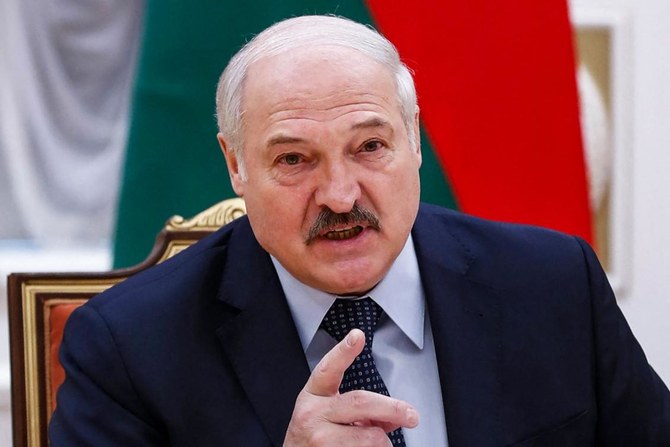LUXEMBOURG: EU foreign ministers on Monday agreed to sanction key sectors of the Belarus economy as the bloc ratchets up pressure on President Alexander Lukashenko after the forced landing of an airliner.
Ministers meeting in Luxembourg backed broad-ranging measures targeting major revenue sources for the Belarusian regime: potash fertilizer exports, the tobacco industry, petroleum and petrochemical products.
Officials said the measures — including a ban on sales of surveillance equipment to Belarus and tightening of an arms embargo — should be formally adopted by the 27-nation bloc in the coming days.
The ministers also officially signed off on adding 86 additional individuals and entities to an assets freeze and visa ban blacklist.
Seven people — including defense minister Viktor Khrenin and transport minister Alexei Avramenko — were sanctioned for the forced landing of a Ryanair passenger jet last month.
The remaining 71 individuals — including Russian tycoon Mikhail Gutseriyev, Lukashenko’s son Dmitry and daughter-in-law Liliya — were targeted for ties to the Belarus government’s sweeping crackdown on opposition or for supporting the regime.
“Today we have confirmed and decided that sectoral sanctions will be taken against Belarus, which will have a severe impact on the Belarusian economy,” German Foreign Minister Heiko Maas said ahead of the meeting.
“We want the release of the political prisoners, an end to the violence against protesters and the opposition, and an inclusive dialogue that will lead to free and fair elections.”
EU foreign policy chief Josep Borrell said earlier that the economic sanctions should be wrapped up after a summit of the bloc’s leaders in Brussels later this week.
“We’re going to hurt the economy of Belarus heavily.”
EU statistics show that trade with Belarus topped 10 billion euros in 2020.
Belarusian opposition leader Svetlana Tikhanovskaya, who insists she rightfully won last year’s poll, welcomed the inclusion of business tycoons and top officials on the blacklist.
“It’s a rather strong sanction list,” she told a press conference in Brussels.
Belarusian strongman Lukashenko sparked international outrage by dispatching a fighter jet on May 23 to intercept the Ryanair plane flying from Greece to Lithuania.
When the plane was forced to land in Minsk, Belarus arrested dissident journalist Roman Protasevich and his girlfriend Sofia Sapega on board.
The EU responded quickly by blocking Belarusian airlines from flying to the bloc and stopped carriers from its 27 nations from using Belarusian airspace.
The bloc had already slapped sanctions last year on 88 individuals — including Lukashenko and his son — over a brutal crackdown on protests since the veteran leader claimed victory at elections in August deemed fraudulent by the West.
The authorities detained thousands during the demonstrations and the EU says that some 500 political prisoners remain behind bars.
“We are clearly showing that Stalinism and state terror no longer have a place in the 21st century,” Luxembourg Foreign Minister Jean Asselborn said.
Lukashenko, ruler of Belarus since 1994, has so far shrugged off the pressure with backing from his key ally Russia.
Lithuania’s Foreign Minister Gabrielius Landsbergis complained that Belarus was hitting back by sending migrants, mostly Iraqis and Syrians, across its border.
He warned the flow could increase after sanctions were approved and that Lithuania “might need help and assistance from other European countries.”
EU targets key Belarus sectors after plane diversion
https://arab.news/4xkdg
EU targets key Belarus sectors after plane diversion

- Ministers meeting in Luxembourg backed broad-ranging measures targeting major revenue sources for Belarus
- Officials said measures include ban on sales of surveillance equipment and tightening of an arms embargo to be formally adopted by 27-nation bloc
NATO wants ‘automated’ defenses along borders with Russia: German general

- That zone would act as a defensive buffer before any enemy forces advanced into “a sort of hot zone,” said Lowin
- The AI-guided system would reinforce existing NATO weapons and deployed forces, the general said
FRANKFURT: NATO is moving to boost its defenses along European borders with Russia by creating an AI-assisted “automated zone” not reliant on human ground forces, a German general said in comments published Saturday.
That zone would act as a defensive buffer before any enemy forces advanced into “a sort of hot zone” where traditional combat could happen, said General Thomas Lowin, NATO’s deputy chief of staff for operations.
He was speaking to the German Sunday newspaper Welt am Sonntag.
The automated area would have sensors to detect enemy forces and activate defenses such as drones, semi-autonomous combat vehicles, land-based robots, as well as automatic air defenses and anti-missile systems, Lowin said.
He added, however, that any decision to use lethal weapons would “always be under human responsibility.”
The sensors — located “on the ground, in space, in cyberspace and in the air” — would cover an area of several thousand kilometers (miles) and detect enemy movements or deployment of weapons, and inform “all NATO countries in real time,” he said.
The AI-guided system would reinforce existing NATO weapons and deployed forces, the general said.
The German newspaper reported that there were test programs in Poland and Romania trying out the proposed capabilities, and all of NATO should be working to make the system operational by the end of 2027.
NATO’s European members are stepping up preparedness out of concern that Russia — whose economy is on a war footing because of its conflict in Ukraine — could seek to further expand, into EU territory.
Poland is about to sign a contract for “the biggest anti-drone system in Europe,” its defense minister, Wladyslaw Kosiniak-Kamysz, told the Gazeta Wyborcza daily.
Kosiniak-Kamysz did not say how much the deal, involving “different types of weaponry,” would cost, nor which consortium would ink the contract at the end of January.
He said it was being made to respond to “an urgent operational demand.”














